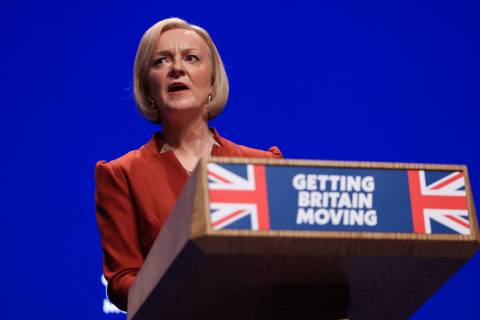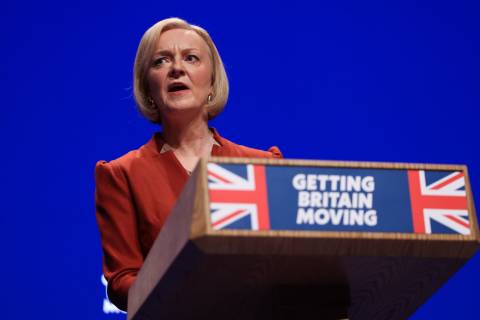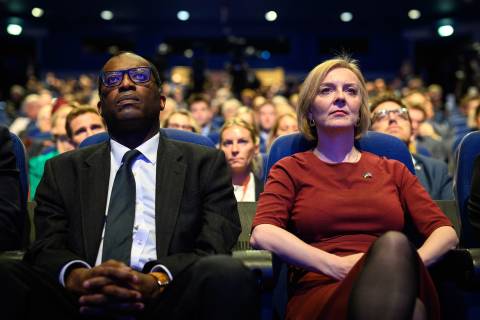(Bloomberg) --

The return of Parliament this week is fraught with danger for UK Prime Minister Liz Truss.

In her first month in office, the 47-year-old premier managed to roil the financial markets, alienate a swath of her lawmakers and sink the Conservative Party in the polls with the biggest set of unfunded tax cuts in half a century.

Since the House of Commons last sat, chasms have opened up over the economic direction Truss and Chancellor of the Exchequer Kwasi Kwarteng are pursuing, and backbenchers smell blood. After forcing the government into a U-turn over its signature tax cut for the highest earners, Tory lawmakers are preparing to challenge their leader over plans to cut welfare benefits, ease planning rules and ramp up borrowing.

“When MPs are on recess there’s more of a limit to plotting but when they return to Westminster they’ll all be in the same place,” said Alice Lilly, senior researcher at the Institute for Government. “That’s going to be more tricky.”
Truss’s Enemies Worked the Tory Members as She Huddled in Crisis
Truss’s missteps mean that despite boasting a 70-odd majority, she finds herself in similar position to Theresa May — whose backbenchers frequently held her 2017-2019 minority government to ransom. The current dissent threatens to stymie the premier’s plan to go for growth through a massive program of deregulation and tax cuts.
At last week’s Tory Party conference, former cabinet ministers Michael Gove and Grant Shapps sounded out restless lawmakers. Members of Truss’s cabinet expressed dismay when she backtracked on scrapping the 45% rate of income tax, and other ministers advocated raising benefits in line with inflation — just as the premier suggested she may cut them in real terms.
But it’s on the backbenches that the greatest danger lies, populated as they are by dozens of former ministers, many of them with an ax to grind after being sacked by Truss and most of whom voted against her in this summer’s leadership contest. One MP said backbenchers are angrier, more determined and more organized than at any point in recent years.
A former minister told Bloomberg they’d witnessed colleagues submitting letters of no confidence in Truss to the office of Graham Brady, chair of the 1922 Committee, which oversees leadership elections. They predicted junior ministers will start resigning within weeks. Another MP said they planned to submit their own letter, while two others said they hoped the “men in gray suits” — senior party figures such as Brady — would hold a papal-style conclave to pick a unifying candidate to replace Truss.
Brewing Rows
Live to the unrest, the premier held one-to-one conversations with Tory MPs during the conference. Sitting opposite them on a sofa in her hotel suite, she tried to reassure them they hadn’t been forgotten and asked how she could earn their support. One MP said she was calm but unilluminating and hadn’t convinced them she would get a grip of the nation’s finances.
Getting her MPs onside is crucial for Truss to advance her agenda. The most controversial bits of Kwarteng’s package won’t go to a vote straight away, giving them time to win support. But further rows are brewing. Truss wants to ease planning rules to encourage construction in designated investment zones. But that’ll face opposition from rural Tory MPs, who stymied planning reforms attempted by her predecessor, Boris Johnson.
And in coming weeks, the government must decide whether to raise benefits in line with inflation or with wages. Truss has indicated she favors the latter. But at conference, ministers Penny Mordaunt, Robert Buckland and Steve Baker all suggested social security should keep pace with inflation.
Truss “almost needs to start to think about operating as though she is a prime minister with a minority government,” the IFG’s Lilly said.
The most memorable moment of the conference was Kwarteng’s reversal of the tax cut for top earners after he and Truss spent days defending it. While some MPs felt Truss’s conference speech on Wednesday was enough to sway the naysayers back onside, others said she merely articulated her libertarian narrative without addressing the elephant in the room: how she’ll fund her program.
Polling Plunge
Kwarteng says he aims to publish a medium-term fiscal plan alongside economic forecasts from the Office for Budget Responsibility on Nov. 23. But he may be forced to do so earlier amid Tory concern that market uncertainty is pushing up interest rates and — crucially — the mortgage rates of voters. The Tory chairman of the Treasury Select Committee, Mel Stride, says it’s needed before Nov. 3, when the BOE’s next rates decision is due.
Parliament’s return Tuesday sees Kwarteng host Treasury questions. Then on Wednesday, he’ll address rebel-minded colleagues in the oak-paneled room of the 1922 committee in a fresh bid to calm nerves.
Dire polling has piled on the pressure, with the opposition Labour Party holding leads of over 20 points in several recent surveys. That’s left Tories on majorities of less than 12,000 increasingly frantic about the need to win back support, one MP said. Truss must call a general election by Jan. 2025 at the latest.
For now, backbenchers don’t have a grand plan — dissent is largely uncoordinated and scattered around different factions of the party. Moreover, Truss’s leadership rival Rishi Sunak — who warned during the contest of the market unrest her plans could unleash — has stayed silent.
In theory, the premier is safe from a leadership challenge for her first year in office. But in practice, Johnson and May both enjoyed the same period of immunity after surviving leadership challenges — and were forced out sooner.
More stories like this are available on bloomberg.com
©2022 Bloomberg L.P.
Author: Ellen Milligan and Joe Mayes
